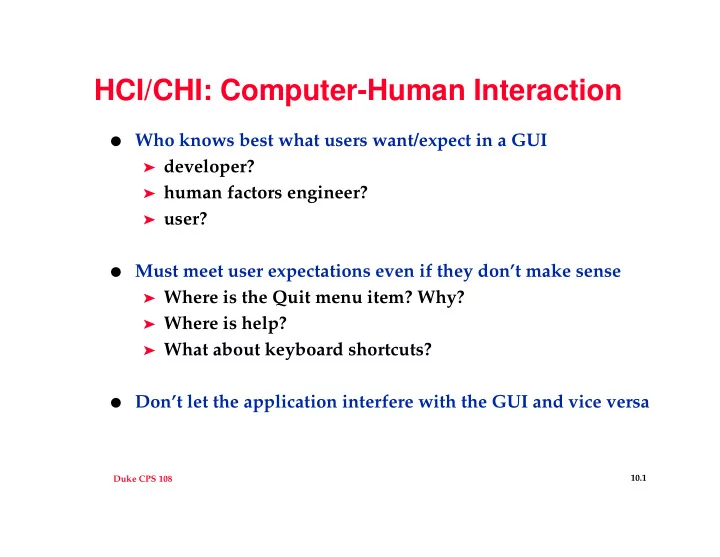

HCI/CHI: Computer-Human Interaction ● Who knows best what users want/expect in a GUI ➤ developer? ➤ human factors engineer? ➤ user? ● Must meet user expectations even if they don’t make sense ➤ Where is the Quit menu item? Why? ➤ Where is help? ➤ What about keyboard shortcuts? ● Don’t let the application interfere with the GUI and vice versa 10.1 Duke CPS 108
GUI programming with C++ ● Widget is a generic term for a GUI component (aka window) ➤ listbox, file dialog, button, slidebar, radio button, ... ➤ widgets (components) typically have child widgets (see the Composite pattern); when a widget is constructed it often requires a parent widget as a parameter ● Design Heuristic: keep GUI and the application separate ➤ minimize coupling in a coupled environment ➤ re-use/redesign one part more easily ● Design Heuristic ➤ don’t have widgets talk to each other (use mediator) ● GUI/applications deal with event processing ➤ mouse clicks, button presses, slidebars, etc. ➤ what mechanism exists for processing events? 10.2 Duke CPS 108
Qt, a GUI toolkit ● events processed with signals and slots ➤ signal generates an event, e.g., button push ➤ slot processes the event, e.g., pop up a file dialog box QPushButton * quitB = new QPushButton(“Quit”,...,...); connect (quitB, SIGNAL(clicked()), qApp, SLOT(quit()); ● qApp is a global variable, of type QApplication ➤ one QApplication per program defined first in main() ➤ main returns qApp.exec() ● SIGNAL and SLOT are macros, expanded by a meta-object compiler (moc) ➤ moc generates .cpp files from user-defined Qt subclasses 10.3 Duke CPS 108
What about Designing GUIs? ● Design decisions: who designs the GUI? ● What (if anything) do you need to know about app internals? ● Qt expertise, who has it? [remember, Java on the horizon] ● Implementation ➤ Lay out the GUI [draw it, sketch it] ➤ get the main widgets up and running, but not connected ➤ develop methods/events that are application specific ➤ develop commands, menus, buttons, etc. ● Compiling using moc, Qt classes, see Makefile 10.4 Duke CPS 108
Avoid inter-widget dependencies ● When widgets talk directly to each other the GUI is hard to modify ➤ removing/changing a widget has (severe) repercussions ➤ widget code clutters up the GUI class ➤ solution: make widgets into classes, encapsulate state and widget behavior into a class, often derived from a widget class: e.g., see FileList , FileDisplay in woogui ● How do application and view/GUI communicate with each other? ➤ Direct communication leads to very tight coupling, hard to modify classes ➤ use a mediator/controller class through which all communication is processed 10.5 Duke CPS 108
Mediator (GOF 273) ● Problem: when to use mediator pattern: ➤ lots of objects communicate in well-defined, but complex ways. Many interdependencies exist, unstructured, hard to get a big picture. ➤ Object re-use is hard because each object is so specialized and refers to lots of other objects ➤ behavior is distributed among several classes ● Mediator is controller, colleagues are objects/widgets ➤ colleagues are decoupled ➤ control is centralized ➤ simplifies colleague/widget protocols ➤ colleague/widget classes are more re-usable 10.6 Duke CPS 108
woogui: mediator and widgets (MVC) 10.7 Duke CPS 108
Library information ● Library: compiled .o files grouped together ➤ linked (at compile or run time) ➤ pre-process, compile, link: where are .h files used? ➤ order of linking/loading libraries matters, only needed source is linked -ltapestry -lqt -lqt -ltapestry vs. ● Static library: linked at compile time, Dynamic/Shared library: linked at run time ➤ not all systems/architectures support dynamic libraries ➤ either the code or the environment must know where shared library is located: -R gmake or LD_LIBRARY_PATH environment variable 10.8 Duke CPS 108
Recommend
More recommend